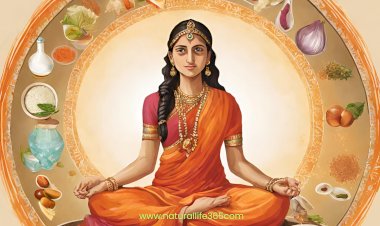The Truth About Ayurveda: Bursting Popular Myths
Discover the truth about Ayurveda by debunking popular myths. Learn the facts and uncover the real benefits of this ancient healing system.

In recent years, Ayurveda has seen a resurgence in popularity as people worldwide seek holistic and natural approaches to health and wellness. Originating in India over 5,000 years ago, this ancient system of medicine offers a comprehensive framework for achieving balance and harmony in body, mind, and spirit. However, with its growing popularity in the West, Ayurveda has also become the subject of various misconceptions and myths that often obscure its true essence and potential benefits.
From being dismissed as unscientific to being misunderstood as merely a collection of herbal remedies, these myths can lead to confusion and skepticism. In this blog, I aim to set the record straight by exploring and debunking some of the most common myths surrounding Ayurveda. By shedding light on these misconceptions, I hope to better understand this timeless tradition and its relevance in the modern world.
Whether you are new to Ayurveda or looking to deepen your knowledge, this guide will help you navigate the world of Ayurvedic wellness with an informed perspective.
Myth 1: Ayurveda is Not Scientific
A common misconception about Ayurveda is that it lacks scientific validity and is based solely on ancient beliefs rather than empirical evidence. This myth stems from a misunderstanding of both Ayurveda's historical roots and its modern applications.
Historical Context and Scientific Basis
Ayurveda, which translates to "the science of life," is one of the oldest systems of medicine in the world, with a rich history dating back thousands of years. It is based on a comprehensive understanding of human physiology, pathology, and the therapeutic properties of plants and minerals. Ancient Ayurvedic texts, such as the Charaka Samhita and Sushruta Samhita, detail sophisticated medical concepts and practices that align with modern scientific principles.
Modern Research and Validation
In recent decades, there has been a growing body of scientific research that supports the efficacy of various Ayurvedic treatments and principles. Numerous studies have investigated the pharmacological effects of Ayurvedic herbs, demonstrating their potential benefits in treating conditions such as inflammation, diabetes, and cardiovascular diseases. For example, curcumin, the active compound in turmeric, has been extensively studied for its anti-inflammatory and antioxidant properties.
Moreover, the principles of Ayurveda, such as the emphasis on a balanced diet, stress reduction, and personalized healthcare, are increasingly recognized by modern medicine as important components of preventive care and wellness. Integrative medicine, which combines conventional and alternative therapies, often incorporates Ayurvedic practices to enhance patient outcomes.
You can also read Turmeric vs Curcumin: Which Should You Take?
Integration with Modern Medicine
Ayurveda and modern medicine are not mutually exclusive but can be complementary. Many healthcare practitioners now advocate for an integrative approach that combines the best of both worlds. For instance, Ayurvedic treatments can be used alongside conventional therapies to support recovery and improve the quality of life for patients with chronic illnesses.
In India, the government has established the Ministry of AYUSH (Ayurveda, Yoga & Naturopathy, Unani, Siddha, and Homoeopathy) to promote research and education in traditional systems of medicine, further bridging the gap between Ayurveda and modern science.
Myth 2: Ayurveda is Only About Herbal Remedies
A prevalent misconception about Ayurveda is that it revolves solely around the use of herbal remedies. While Ayurveda indeed utilizes a vast array of medicinal herbs, this understanding is only a fraction of the comprehensive and holistic approach that Ayurveda embodies.
Holistic Health System
Ayurveda is a complete system of medicine that goes far beyond herbal treatments. It emphasizes a holistic approach to health, incorporating a wide range of practices aimed at achieving balance and harmony in body, mind, and spirit. These practices include diet, lifestyle modifications, detoxification, yoga, and meditation, all tailored to the individual's unique constitution or Prakriti.
Understanding Doshas
Central to Ayurveda is the concept of doshas—Vata, Pitta, and Kapha—which represent different energies in the body. Each person has a unique balance of these doshas that influences their physical, mental, and emotional characteristics. Ayurvedic practitioners assess an individual's dosha composition to recommend personalized treatments and lifestyle choices that promote optimal health and well-being.
Diet and Lifestyle
Diet plays a crucial role in Ayurveda, with specific foods recommended to balance the doshas and support digestion and metabolism. Ayurvedic dietary guidelines are designed to nourish the body, prevent disease, and maintain harmony with the natural cycles of the environment.
Lifestyle recommendations in Ayurveda often include daily routines (dinacharya) and seasonal regimens (ritucharya) that help individuals maintain balance in their lives. These routines encourage practices such as regular exercise, adequate sleep, and mindfulness techniques to enhance physical and mental well-being.
Yoga and Meditation
Ayurveda places significant emphasis on the mind-body connection, recognizing that mental and emotional health are integral to overall wellness. Yoga and meditation are key components of the Ayurvedic lifestyle, used to cultivate mental clarity, reduce stress, and promote emotional balance. These practices complement the physical aspects of Ayurveda, creating a holistic framework for health.
Detoxification and Rejuvenation
Ayurveda includes specialized therapies for detoxification and rejuvenation, such as Panchakarma. These therapies aim to eliminate toxins, restore balance, and rejuvenate the body and mind. Panchakarma involves a series of treatments tailored to the individual's needs, often including massages, herbal treatments, and dietary adjustments.
Myth 3: Ayurvedic Treatments are Slow and Ineffective
A common belief is that Ayurvedic treatments take too long to show results and are less effective compared to modern medicine. This misconception arises from a misunderstanding of how Ayurveda approaches health and healing.
Focus on the Root Cause
Unlike conventional medicine, which often focuses on alleviating symptoms, Ayurveda aims to address the root cause of health issues. This approach may require more time initially, but it often leads to more sustainable and lasting results. By treating the underlying imbalances and promoting holistic wellness, Ayurveda seeks to prevent the recurrence of ailments and improve overall health.
Long-Term Health Benefits
Ayurvedic treatments emphasize long-term health and well-being over quick fixes. This means that while some improvements may take time, the benefits are often more enduring. For instance, Ayurveda can be particularly effective for chronic conditions, where lifestyle and dietary changes play a significant role in managing symptoms and enhancing quality of life.
Personalized Approach
The effectiveness of Ayurvedic treatments lies in their personalized nature. Practitioners assess an individual’s unique constitution and health status to tailor treatments specifically for them. This individualized approach ensures that therapies are aligned with the person’s needs, leading to more effective outcomes over time.
Evidence of Effectiveness
Numerous studies have demonstrated the efficacy of Ayurvedic treatments for various health conditions. For example, Ayurvedic therapies have been shown to improve symptoms in patients with arthritis, digestive disorders, and skin conditions. These treatments often include a combination of herbal remedies, dietary adjustments, and lifestyle changes that work synergistically to promote healing.
Complementary Role with Modern Medicine
Ayurveda can play a complementary role alongside modern medicine. Integrative approaches that combine Ayurvedic practices with conventional treatments can enhance the effectiveness of both, providing a more comprehensive path to recovery. For acute conditions, Ayurvedic therapies can support the healing process and improve overall wellness when used in conjunction with modern medical interventions.
Myth 4: Ayurveda is Only for Indians
A common misconception is that Ayurveda is relevant only to Indian culture and people. While Ayurveda originated in India and is deeply rooted in its traditions, it offers universal principles and practices that can benefit people worldwide, regardless of their cultural background.
Global Appeal and Adoption
In recent decades, Ayurveda has gained global recognition and popularity as people from diverse cultures seek holistic and natural approaches to health and wellness. Its principles of balance, harmony, and individualized care resonate with individuals seeking alternatives to conventional medicine. Many wellness centers and spas worldwide now incorporate Ayurvedic therapies and practices, highlighting its global appeal.
Universal Principles
The core principles of Ayurveda—such as maintaining balance in the body, mind, and spirit, understanding the connection between diet and health, and the importance of preventative care—are universal. These principles can be adapted to suit different cultures and lifestyles, making Ayurveda accessible and applicable to everyone.
Customization for Individual Needs
Ayurveda emphasizes personalized care, tailoring treatments and lifestyle recommendations to each individual's unique constitution, or Prakriti. This individualized approach transcends cultural boundaries, allowing people from all backgrounds to benefit from Ayurvedic practices that are specifically designed to meet their needs.
Global Endorsement
Ayurveda has garnered endorsements from celebrities, wellness experts, and healthcare practitioners worldwide. Its integration into various health and wellness programs demonstrates its acceptance and efficacy beyond India. Additionally, international organizations and universities offer courses and certifications in Ayurveda, further promoting its global reach.
Cultural Exchange and Fusion
As Ayurveda spreads globally, it continues to evolve through cultural exchange and fusion with other traditional and modern healing practices. This cross-pollination enriches Ayurveda, making it more diverse and adaptable to the needs of people from different regions.
Myth 5: Ayurvedic Products are Always Safe
A common misconception is that all Ayurvedic products are inherently safe because they are natural. While Ayurveda prioritizes natural ingredients, it is essential to approach Ayurvedic products with the same caution and discernment as any other healthcare product.
Natural Does Not Always Mean Safe
The assumption that natural equates to safety can be misleading. Just like any other substance, Ayurvedic herbs and formulations can have side effects, especially when used improperly or in excessive amounts. For example, certain herbs may interact with medications or be contraindicated for specific health conditions. Therefore, it is crucial to consult a qualified Ayurvedic practitioner before starting any treatment.
Importance of Qualified Guidance
Ayurveda is a complex system of medicine that requires a deep understanding of its principles to apply treatments effectively. Self-prescribing Ayurvedic products without professional guidance can lead to adverse effects or ineffective treatment. A qualified practitioner can provide personalized recommendations based on an individual's unique constitution and health needs, ensuring safe and effective use.
Quality and Sourcing Concerns
The quality and safety of Ayurvedic products can vary significantly depending on the source. Some products on the market may be adulterated or contain contaminants such as heavy metals, pesticides, or other harmful substances. To ensure safety, it is essential to purchase Ayurvedic products from reputable and certified manufacturers who adhere to strict quality control standards.
Regulation and Standardization
While Ayurveda has been practiced for thousands of years, the regulation of Ayurvedic products is still evolving. Different countries have varying levels of oversight and standards for these products, which can impact their safety and efficacy. It is important to be aware of the regulatory framework in your region and choose products that meet established safety and quality standards.
Educating Consumers
Consumers should educate themselves about Ayurvedic practices and products to make informed decisions about their health. This includes understanding the proper use of products, potential side effects, and the importance of professional guidance. By being informed, consumers can enjoy the benefits of Ayurveda while minimizing potential risks.
You can also read What is the Difference Between Ayurveda and Homeopathy?
Myth 6: Ayurveda Can Replace Modern Medicine
A common misconception is that Ayurveda can entirely replace modern medicine. While Ayurveda offers valuable insights and treatments, it is important to recognize its role as a complementary system that works alongside modern medicine rather than as a complete substitute.
Complementary, Not Replacement
Ayurveda and modern medicine serve different purposes and can be most effective when used together. Ayurveda excels in preventive care, holistic health, and chronic disease management, focusing on balance and long-term wellness. Modern medicine, on the other hand, is highly effective in acute care, surgical interventions, and treating life-threatening conditions with advanced technology and pharmaceutical drugs.
Integrative Approaches
The most effective healthcare often combines the strengths of both systems. Integrative medicine, which merges conventional and alternative approaches, is gaining popularity for its ability to provide comprehensive care. For instance, a patient undergoing cancer treatment may use Ayurvedic practices such as dietary changes and stress reduction techniques to support overall well-being and enhance recovery alongside chemotherapy or radiation therapy.
When to Choose Modern Medicine
There are situations where modern medicine is indispensable, such as in emergencies, severe infections, and complex surgeries. In these cases, Ayurveda can play a supportive role by promoting recovery, reducing side effects, and improving quality of life through lifestyle and dietary adjustments.
Evidence-Based Practices
While Ayurveda offers numerous benefits, it is essential to rely on evidence-based practices in both systems. Patients should seek treatments with proven efficacy and consult healthcare professionals who are knowledgeable about both Ayurveda and modern medicine. This ensures safe and effective care tailored to the individual's needs.
Collaboration Between Practitioners
The collaboration between Ayurvedic practitioners and conventional healthcare providers is crucial for delivering holistic care. Open communication and mutual respect between these professionals can lead to better patient outcomes by leveraging the strengths of each system.
Wrapping Up
Are you ready to explore the benefits of Ayurveda and incorporate its holistic practices into your lifestyle? Start by consulting a qualified Ayurvedic practitioner who can provide personalized guidance tailored to your unique needs. Whether you're seeking to improve your overall wellness or address specific health concerns, Ayurveda offers a wealth of tools to help you achieve balance and vitality.
For those interested in deepening their understanding of Ayurveda, consider enrolling in courses or workshops that offer comprehensive insights into its principles and practices. Numerous online and in-person resources are available to help you embark on your Ayurvedic journey.
Explore reputable sources for Ayurvedic products, ensuring they meet quality and safety standards. Always prioritize your health by choosing trusted brands and certified products.
I invite you to share your experiences with Ayurveda and engage with a community of like-minded individuals seeking holistic wellness. Whether you're a newcomer or have been practicing Ayurveda for years, your journey can inspire others to discover the benefits of this ancient healing system.
Join us in embracing a balanced and healthy lifestyle through Ayurveda, and stay connected for more insights and tips on integrating holistic practices into your daily life.
Some Recommended Books
1. The Complete Book of Ayurvedic Home Remedies by Vasant Lad. This book provides a comprehensive guide to Ayurvedic treatments for common ailments, offering home remedies and lifestyle advice.
2. Ayurveda: The Science of Self-Healing by Vasant Lad. This book introduces the basic principles of Ayurveda, including practical advice on diet, exercise, and lifestyle practices to promote health.
3. The Everyday Ayurveda Cookbook: A Seasonal Guide to Eating and Living Well by Kate O'Donnell. This cookbook offers Ayurvedic recipes and guidance on eating seasonally to support health and balance.
4. Ayurveda: A Life of Balance by Maya Tiwari. This book explores Ayurvedic principles of nutrition and lifestyle, providing insights into how to achieve balance and health.
5. Ayurveda Beginner's Guide: Essential Ayurvedic Principles and Practices to Balance and Heal Naturally by Susan Weis-Bohlen. Aimed at newcomers, this guide provides an overview of Ayurveda, including practical tips for incorporating its principles into daily life.
6. Everyday Ayurveda: Daily Habits That Can Change Your Life by Dr Bhaswati Bhattacharya. Informative and accessible, Everyday Ayurveda is the perfect lifestyle guide designed to maximize health, longevity and happiness the natural way.
If you value these free online resources provided by Natural Life 365, please consider supporting my website by sharing the blogs ![]()
DISCLAIMER:
Some of the links in this content may be affiliate links. This means that if you click on one of the links and make a purchase, I may receive a commission (at no extra charge to you). However, I only recommend products that I personally use and have tested myself. Also, understand that I have taken reasonable steps to ensure that the information on this content is accurate, but I cannot represent that the website(s) mentioned in this post are free from errors. Please, check the Affiliate Disclosure at the bottom of this website.







































